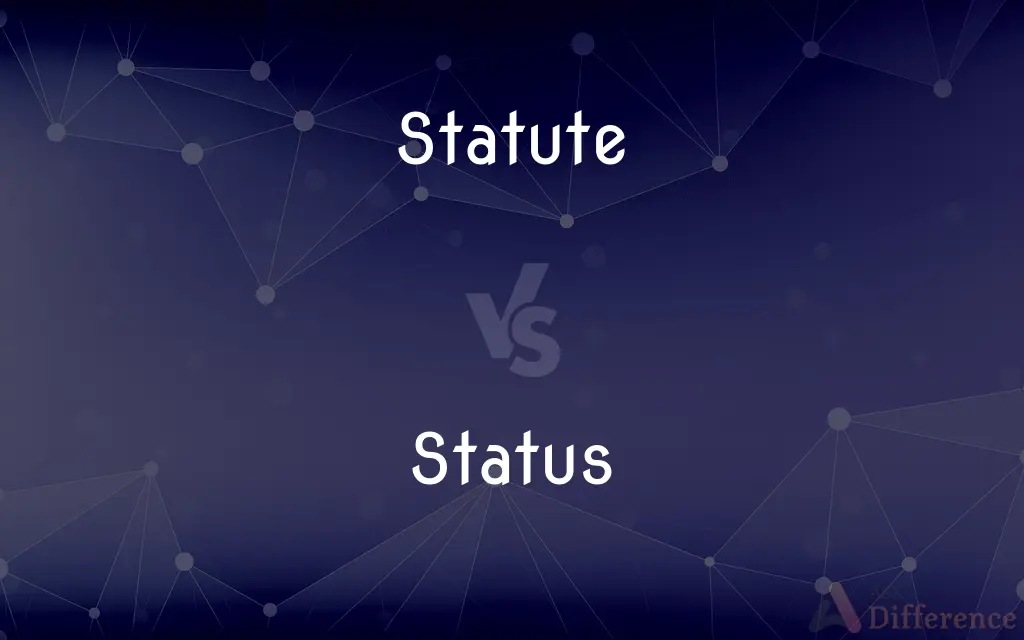Statute vs. Status — What's the Difference?
By Tayyaba Rehman & Fiza Rafique — Updated on March 27, 2024
A statute is a formal law enacted by a legislative body; status refers to a person's or thing's condition or position in relation to others.

Difference Between Statute and Status
Table of Contents
ADVERTISEMENT
Key Differences
A statute is a written law passed by a legislative body, aiming to regulate, authorize, proscribe, or provide frameworks within a jurisdiction. Whereas, status denotes the current condition, situation, or legal standing of an individual, organization, or an object in comparison to others, often changing due to circumstances.
Statutes are explicitly created and formally codified, reflecting the intent of a governing body to establish order, rights, or obligations. On the other hand, status can be a result of various factors, including societal norms, legal rulings, or personal achievements, and may not always be formally codified.
The process of enacting a statute involves legislative proposals, debates, and approvals, showcasing a structured and often lengthy process aimed at creating laws. In contrast, the status of an entity can change more dynamically and might result from legal actions, societal changes, or personal developments.
Statutes are subject to judicial interpretation, which can influence their application and enforcement in legal contexts. Meanwhile, the status of an individual or entity may be recognized or disputed in legal systems, but it can also be a broader social or professional designation not limited to legal definitions.
While statutes are an essential part of statutory law, forming a codified legal framework, status encompasses a broader range of conditions and rankings within society, legal systems, or particular fields, without necessarily being tied to specific legal statutes.
ADVERTISEMENT
Comparison Chart
Definition
A formal law enacted by a legislative body.
The condition or position of a person or thing in relation to others.
Purpose
To regulate, authorize, or proscribe actions within a jurisdiction.
To denote the current condition, legal standing, or social rank.
Creation
Through legislative processes involving drafting, debate, and approval.
Can be achieved or assigned based on law, achievements, or social constructs.
Nature
Static until amended or repealed, with clear legal boundaries.
Dynamic, often changing due to personal, legal, or societal factors.
Legal Context
Integral part of statutory law, directly impacting legal rights and obligations.
May influence legal decisions but also extends to social and professional realms.
Compare with Definitions
Statute
A statute defines legal obligations.
The statute requires businesses to provide accessible facilities.
Status
It can be informal or formal.
The club has a status system for its members.
Statute
Statutes are enacted by legislatures.
The state legislature passed a new statute on environmental protection.
Status
Status indicates social position.
Her status in the community has grown.
Statute
Statutes can be repealed or amended.
The outdated statute was finally repealed last year.
Status
Status affects access and rights.
Her status granted her special privileges.
Statute
They serve as a basis for regulations.
Regulations are issued to implement the statute's provisions.
Status
It can reflect legal standing.
His status as a resident was confirmed.
Statute
They are codified into law books.
The statute was added to the state's criminal code.
Status
Status changes over time.
Their financial status improved dramatically.
Statute
A statute is a formal written enactment of a legislative authority that governs the legal entities of a city, state, or country by way of consent. Typically, statutes command or prohibit something, or declare policy.
Status
Relative social or professional position; standing
An improvement in the status of women
Statute
A law enacted by a legislature.
Status
The situation at a particular time during a process
An update on the status of the bill
Statute
A decree or edict, as of a ruler.
Status
Position relative to that of others; standing
Her status is that of a guest.
Statute
Written law, as laid down by the legislature.
Status
High standing; prestige
A position of status in the community.
Statute
An act of a corporation or of its founder, intended as a permanent rule or law; as, the statutes of a university.
Status
(Law) The legal character or condition of a person or thing
The status of a minor.
Statute
An assemblage of farming servants (held possibly by statute) for the purpose of being hired; - called also statute fair.
Status
The state of affairs; the situation
What is the status of the negotiations?.
Statute
An act passed by a legislative body
Status
A person’s condition, position or standing relative to that of others.
Superstition is highly correlated with economic status.
Statute
Enacted by a legislative body;
Statute law
Codified written laws
Status
Or high standing.
Status
A situation or state of affairs.
What's the status of the investigation?
New York is known for its status as a financial center.
Status
(legal) The legal condition of a person or thing.
Status
The state (of a Canadian First Nations person) of being registered under the Indian Act.
He is a status Indian.
Status
(social networking) A function of some instant messaging applications, whereby a user may post a message that appears automatically to other users, if they attempt to make contact.
I'm just about to update my status to "busy".
Status
(medicine) Short for status asthmaticus.}}
Status
State; condition; position of affairs.
Status
The relative position or standing of things or especially persons in a society;
He had the status of a minor
The novel attained the status of a classic
Atheists do not enjoy a favorable position in American life
Status
A state at a particular time;
A condition (or state) of disrepair
The current status of the arms negotiations
Common Curiosities
What does status mean?
Status refers to the condition, position, or standing of a person or thing in relation to others, encompassing legal, social, or professional aspects.
How is a statute created?
A statute is created through a legislative process, including drafting, debate, and approval by a legislative body.
Can status be legally defined?
Yes, status can have legal definitions, such as citizenship status, but it also extends to social and professional rankings.
Do statutes change?
Statutes can be amended or repealed by the same legislative process through which they were created.
Can someone’s status change?
Yes, an individual's status can change due to various factors, including legal decisions, societal changes, or personal achievements.
How does status affect an individual?
Status affects an individual’s rights, obligations, and social position, influencing their interaction within society and with legal systems.
Who enacts statutes?
Statutes are enacted by legislative bodies, such as parliaments or congresses.
What is a statute?
A statute is a formal law enacted by a legislative body to regulate, authorize, or prohibit actions within its jurisdiction.
Is status important in society?
Yes, status plays a crucial role in societal structure, affecting individuals’ social, professional, and legal interactions.
Are statutes applicable to everyone?
Statutes are generally applicable to everyone within the jurisdiction they cover, unless specified otherwise.
What role do statutes play in legal systems?
Statutes form a significant part of statutory law, serving as the basis for regulations and legal frameworks.
Can statutes be challenged?
Yes, statutes can be challenged in courts if deemed unconstitutional or in violation of other legal principles.
What factors influence status?
Status can be influenced by legal actions, societal norms, and personal or organizational achievements.
How is status recognized?
Status can be recognized formally through legal documentation or informally through social acknowledgment.
What is the difference between statute and law?
A statute is a specific type of law formally enacted by a legislative body, whereas "law" can refer to a broader range of legal norms, including statutory laws, regulations, and case law.
Share Your Discovery

Previous Comparison
Anger vs. Passion
Next Comparison
Shahada vs. KalimaAuthor Spotlight
Written by
Tayyaba RehmanTayyaba Rehman is a distinguished writer, currently serving as a primary contributor to askdifference.com. As a researcher in semantics and etymology, Tayyaba's passion for the complexity of languages and their distinctions has found a perfect home on the platform. Tayyaba delves into the intricacies of language, distinguishing between commonly confused words and phrases, thereby providing clarity for readers worldwide.
Co-written by
Fiza RafiqueFiza Rafique is a skilled content writer at AskDifference.com, where she meticulously refines and enhances written pieces. Drawing from her vast editorial expertise, Fiza ensures clarity, accuracy, and precision in every article. Passionate about language, she continually seeks to elevate the quality of content for readers worldwide.
















































